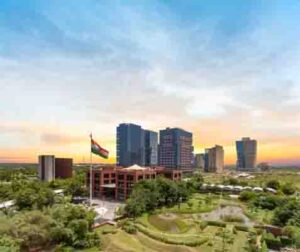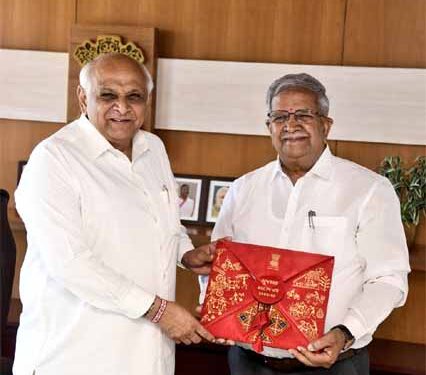GANDHINAGAR, FEB 20
Gujarat Finance Minister Kanubhai Desai on Thursday presented a ₹3,70,250 crore budget for the state for the financial year 2025-26, giving tax reliefs of ₹ 148 crore. Also, no new tax was proposed in the budget, presented by Desai in the state assembly here on the second day of its budget session. This marks the fourth consecutive budget under his leadership, focusing on education, infrastructure, skill development, and social welfare.
Gujarat Chief Minister Bhupendra Patel on Thursday hailed his government’s budget for 2025-26 and said it reflects the commitment to make the state developed and make the lives of its citizens comfortable and prosperous.
- A budget that reflects commitment to ‘Vision of a Viksit Gujarat, Mission of Jan Kalyan’: Chief Minister Bhupendrabhai Patel
- The budget outlay of ₹ 3,70,250 crore for 2025-26 indicates an increase of Rs 37,785 crore, or 11.3 per cent, compared to the previous fiscal
- A major highlight is the ₹ 59,999 crore allocation for education
- The budget includes a ₹50,000 crore Viksit Gujarat Fund and tax relief measures
- Budget projects an estimated ₹859 crore surplus for the financial year 2025-26.
“The budget is a blueprint for systematically implementing Prime Minister Narendra Modi’s vision of ‘Viksit Bharat’ through public welfare schemes. As part of this, a ₹ 50,000 crore Viksit Gujarat Fund has been announced to boost the state’s growth. The budget, the largest in the state’s history, reflects a commitment to development, with a 21.8 per cent increase in capital expenditure compared to the previous year,” the CM said.
Desai informed the House that the budget outlay of ₹3,70,250 crore for 2025-26 indicates an increase of ₹ 37,785 crore, or 11.3 per cent, compared to the previous fiscal. The state government proposed a tax relief of ₹ 18 crore in the form of reduction in stamp duty on mortgage deeds and on motor vehicle tax on electric vehicles. In his budgetary address, Desai announced a host of new schemes and projects and said the budget was based on five pillars – social security, human resource development, infrastructure development, green growth and development of economic activities.
A major highlight is the ₹59,999 crore allocation for education, reinforcing Gujarat’s commitment to modernizing its education system to align with global standards and the Viksit Bharat 2047 vision.
The budget places a strong emphasis on improving education quality and accessibility. The Mission Schools of Excellence programme will receive ₹2,914 crore, enabling structural improvements in over 25,000 classrooms. The Namo Lakshmi Yojana has been allocated ₹1,250 crore to promote girls’ education, while ₹ 782 crore will be spent under the Right to Education (RTE) Act to support students in private schools. The Namo Saraswati Vigyan Sadhana Yojana will benefit 2.5 lakh students with an allocation of ₹ 250 crore, and ₹ 223 crore has been earmarked for student travel concessions in State Transport (ST) buses.
The Gyan Shakti Residential Schools of Excellence will receive ₹ 200 crore to enhance residential education facilities. Scholarships also see a significant push, with Rs 100 crore for the Gyan Sadhana Merit Scholarship, benefiting 75,000 students, and ₹70 crore for the Gyan Setu Merit Scholarship, assisting 90,000 students. The recruitment of over 22,000 teachers in government and aided schools is also underway, addressing staff shortages and improving education quality. A substantial portion of the budget is dedicated to infrastructure development, with a focus on roadways, public transportation, and smart city initiatives.
Healthcare and infra get boost
Key investments include ₹ 5,000 crore for road expansion projects, ₹ 4,000 crore for smart cities, and ₹ 3,500 crore for urban housing projects. The government aims to enhance connectivity between industrial hubs and rural areas, boosting economic growth. The healthcare sector has been allotted over ₹ 40,000 crore, with plans to establish new hospitals and upgrade existing facilities.
A key initiative includes the integration of AI-based diagnostics in government hospitals to enhance patient care. The Ayushman Bharat Yojana has been allocated ₹3,200 crore, ensuring wider healthcare coverage for low-income families.
Women empowerment
Gujarat continues its focus on women’s empowerment with ₹ 15,000 crore allocated to the schemes for nutrition, financial independence, and safety. The Namo Lakshmi Yojana and Mukhyamantri Mahila Udyam Yojana are key initiatives that encourage education and entrepreneurship among women.
The government also plans to strengthen anganwadis and child nutrition programmes, ensuring better healthcare for children in rural and urban areas.
Skill development
With Gujarat emerging as an industrial hub, the budget emphasizes job creation and entrepreneurship. The state has allocated ₹ 10,000 crore towards skill development and startup incentives, focusing on IT, AI, renewable energy, and manufacturing sectors. New training centres and incubation hubs will be established to equip youth with industry-ready skills.
Agriculture
To support Gujarat’s agricultural sector, the government has set aside ₹ 25,000 crore for irrigation, smart farming techniques, and crop insurance subsidies.
The Mukhyamantri Kisan Yojana will receive a major boost, ensuring better irrigation facilities and financial support for farmers. The focus is on sustainable agriculture, water conservation, and the adoption of technology-driven farming practices. Gujarat has committed ₹ 12,000 crore towards solar, wind, and hydrogen power projects. The state aims to increase its solar capacity by 5,000 MW and invest in electric vehicle (EV) infrastructure, making Gujarat a major player in India’s green energy transition.
Budget highlights
- A ₹50,000 crore Viksit Gujarat fund announced.
– Significant provisions made to strengthen infrastructure and connectivity.
– Two new Greenfield Expressways, Namo Shakti Expressway and Somnath-Dwarka Expressway, along with 12 new high-speed corridors, will be developed. A new airport will also be developed in Dahod.
– The year 2025 will be designated as Urban Development Year to fast-track the development of world-class cities. The urban development budget has been increased by 40%, with financial allocations for the structural development of new municipal corporations.
– The financial assistance under PM Awas Yojana (Rural) for housing the poor has been raised to ₹1.70 lakh.
– Allocation of ₹30,000 crore under the Vanbandhu Welfare Scheme for the welfare of tribal communities.
– A historic ₹1,622 crore package has been introduced to boost the growth and development of the state’s fisheries sector.
– A budget allocation of ₹8,460 crore has been made for children’s nutrition.
‘Allocation for infra development within GIFT City will support the creation of a more robust and efficient business ecosystem’
Tapan Ray, MD and Group CEO, GIFT City, said: “The Gujarat Budget 2025-26 reaffirms the state government’s continued commitment to strengthening GIFT City’s infrastructure and enhancing its position as a global financial and technology hub. The proposed allocation for infrastructure development within GIFT City will support the creation of a more robust and efficient business ecosystem.

Additionally, the continued development of the Sabarmati Riverfront linking Ahmedabad, GIFT City, and Gandhinagar will further improve connectivity, and open up new recreational areas, making GIFT City an even more attractive destination for global enterprises. These initiatives will accelerate business growth, facilitate greater investments, and contribute to the overall economic development of the region, leading to better quality of life.”










